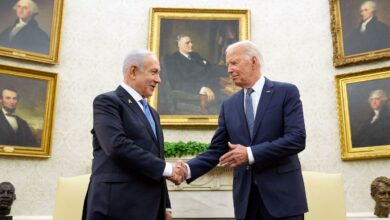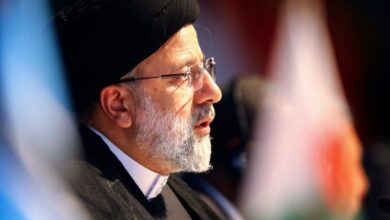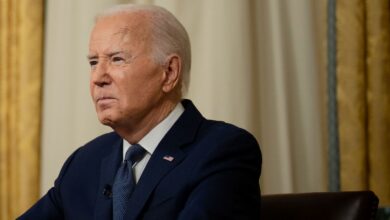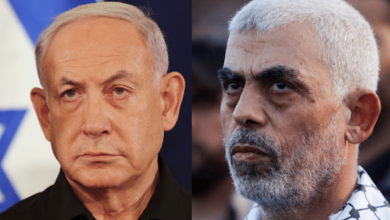Bukele Calls It “Preposterous” to Return Abrego Garcia to U.S.—And He’s Not Backing Down
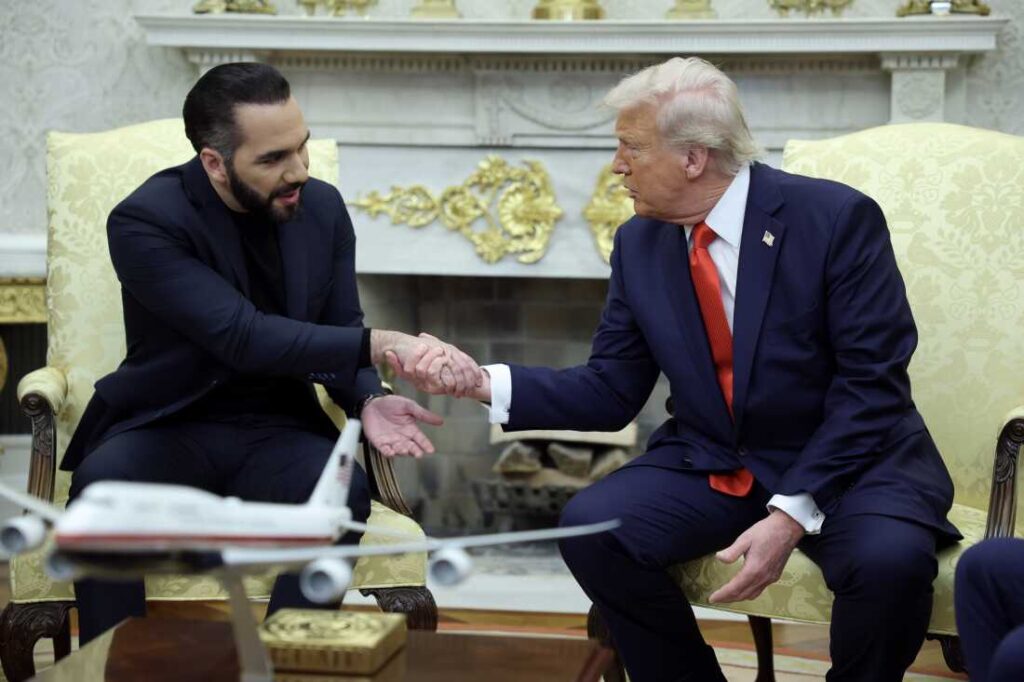
Image Credit: Win McNamee/Getty Images
WASHINGTON, DC – APRIL 14: U.S. President Donald Trump meets with President Nayib Bukele of El Salvador in the Oval Office of the White House April 14, 2025 in Washington, DC. Trump and Bukele were expected to discuss a range of bilateral issues including the detention of Kilmar Armando Abrego Garcia, who has been held in a prison in El Salvador since March 15.
El Salvador’s President Nayib Bukele is no stranger to headlines, and once again, he’s found himself smack in the middle of an international controversy. This time, it’s over a man named Kilmar Armando Abrego Garcia, a Salvadoran citizen who lived in Maryland for more than 15 years before being deported under questionable circumstances.
Now, Bukele’s flat-out refusing to return him—even though the U.S. Supreme Court says he should.
“The question is preposterous: how can I smuggle a terrorist into the United States?” Bukele said in a press conference on Monday, during his Oval Office visit with former President Donald Trump.
Yeah. Things are getting real.
So, Who Is Kilmar Abrego Garcia?
Let’s rewind a bit. Kilmar Armando Abrego Garcia isn’t exactly a household name, but his story has become a flashpoint in the heated immigration debate between the U.S. and El Salvador.
Abrego Garcia is originally from El Salvador, but he lived in the United States—Maryland, to be exact—for around 15 years. He had even been granted protections by a U.S. immigration judge, which is a big deal.
But despite those protections, he was suddenly deported.
Now? He’s locked up in CECOT, Bukele’s notorious “mega prison” designed to hold alleged gang members and criminals—a place 60 Minutes called one of the largest prisons in the world.
You might recognize CECOT from the viral drone footage of prisoners lined up shirtless, hunched over, with shaved heads. That prison.
The catch? Abrego Garcia’s lawyer says he’s not in a gang. He’s just a guy who got caught in a whirlwind of legal chaos.
A Supreme Court Twist
The U.S. Supreme Court recently weighed in on the whole affair, specifically focusing on the Alien Enemies Act, a law originally passed in 1798 and used during the War of 1812, World War I, and World War II.
Yep, you read that right—1798. That’s more than 220 years ago.
The Trump administration revived this ancient law to fast-track deportations of migrants from countries they consider hostile or threatening, including Venezuela and El Salvador. The administration claims many of them are gang-affiliated.
The Supreme Court ruled that the administration could use the Alien Enemies Act for these deportations, but it also told the Trump team:
You’ve got to bring Abrego Garcia back.
As in: You wrongly deported him. Fix it.
Trump Admin’s Response: “We’ll Provide a Plane… That’s It”
Following the Supreme Court ruling, you’d think there would be a mad dash to bring Abrego Garcia back. But, not exactly.
Attorney General Pam Bondi, who joined the Oval Office meeting with Bukele, said that the U.S. government had done its part by simply offering a plane for the return.
“That’s up to El Salvador if they want to return him,” Bondi said.
“That’s not up to us.”
So, technically the Trump team believes they’ve fulfilled their obligation. After all, it’s El Salvador that’s holding the guy now, in their own prison.
Bondi also tried to brush off the deportation as a “paperwork issue”, saying Abrego Garcia wasn’t in the U.S. legally anyway.
But his immigration judge’s protections? Still a thing.
Bukele’s Take: “I’m Not Smuggling a Terrorist”
Bukele didn’t mince words when reporters asked if he’d return Abrego Garcia.
“The question is preposterous,” he snapped.
“How can I smuggle a terrorist into the United States?”
Bukele’s statement paints Garcia as a national security threat, even though his attorney insists he’s never been part of a gang or committed a serious crime.
Meanwhile, Garcia’s wife, Jennifer Vasquez Sura, is fighting to get him back. She appeared at a Capitol Hill press conference on April 9 to highlight the injustice of his removal.
“He’s not a gang member. He’s not a criminal. He’s a husband and a father,” she said, holding back tears.
A Bigger Picture: The U.S. Is Paying El Salvador to Hold Migrants
And here’s another wrinkle that adds fuel to the fire: the Trump administration is paying El Salvador $6 million to house migrants in CECOT.
That’s right—$6 million to keep deported individuals, many of whom haven’t had due process, locked up in Bukele’s mega prison.
It’s part of a growing partnership between the Trump camp and Bukele’s government, especially when it comes to managing deportations. Trump has praised Bukele as a strong ally in cracking down on gangs like MS-13 and Barrio 18.
But critics say this alliance comes at the cost of human rights and due process.
“Bukele’s mega prison has been accused of torture and indefinite detention,” reports Human Rights Watch.
Read More:
- 5.2 Magnitude Earthquake Shakes Southern California, Alarming Residents Across the Region
- Protesters Tee Off Against Trump and Musk in Nationwide “Hands Off!” Rallies
- Amazon Joins the Race to Buy TikTok Amid Threat of U.S. Ban
“World’s Coolest Dictator” or Democratic Disruptor?
Bukele, who once jokingly dubbed himself the “World’s Coolest Dictator”, is no stranger to criticism from human rights groups. But he’s also wildly popular at home.
His iron-fist approach to crime—especially gangs—has led to a dramatic drop in homicides in El Salvador. But that success story comes with allegations of mass surveillance, militarized policing, and freedom of the press violations.
And now, the United States is caught in the middle.
The Political Optics
Bukele’s visit to the White House this week wasn’t just about Abrego Garcia. It was a symbolic show of strength between two populist leaders: Trump and Bukele.
Their September 25, 2019 meeting at the United Nations marked the start of their friendship. This week’s Oval Office reunion just reinforced it.
In the meeting, White House Deputy Chief of Staff Stephen Miller backed Bukele’s decision to hold onto Abrego Garcia.
“He’s a citizen of El Salvador,” Miller said.
“So it’s very arrogant even for American media to suggest that we would tell El Salvador how to handle their own citizens.”
Secretary of State Marco Rubio echoed that sentiment, saying the decision is ultimately in Bukele’s hands.
In short: “Our hands are tied.”
What’s Next?
As of now, Kilmar Abrego Garcia remains in CECOT, with no indication he’ll be returned anytime soon.
The Biden campaign has called the deportation and detention “an embarrassment,” and pledged to reverse policies tied to the Alien Enemies Act if elected. But for Garcia and his family, that promise doesn’t mean much right now.
In fact, many critics are wondering how a 200-year-old wartime law is still shaping lives today—and why basic due process can be brushed aside.
As immigration attorney Linda Chavez put it on CNN,
“We’re seeing the revival of Cold War tactics under a modern-day façade of security. And innocent people like Abrego Garcia are paying the price.”
Public Reaction
The response on social media has been fierce.
#FreeKilmar trended on X (formerly Twitter) Tuesday morning.
Civil rights groups like the ACLU and RAICES issued statements condemning the detention.
TikTok videos featuring Garcia’s wife sharing their story have gained over 2 million views.
Meanwhile, Bukele’s base at home continues to support his hardline stance.
“Why should we send him back? He’s our citizen. We decide,” said one top commenter on Bukele’s Facebook page.
The Legal Loophole: Alien Enemies Act
For those unfamiliar, the Alien Enemies Act was one of four laws passed under the Alien and Sedition Acts of 1798.
Originally designed to allow the President to detain or deport any male citizen of a hostile nation during times of war, it’s been dusted off by modern administrations to go after so-called “undesirable” immigrants.
Legal scholars are already raising red flags about its use today.
“It’s a law designed for wartime with sovereign nations, not gang crackdowns,” says Professor David Bier of the Cato Institute.
“It’s being stretched way beyond its original intent.”
Final Thoughts
At the heart of this entire situation is a simple question: Should a man with legal protections be ripped from his home, labeled a gang member, and thrown into a foreign mega prison without trial?
The U.S. Supreme Court says no.
President Nayib Bukele says too bad.
And the Trump administration? Well, they say our job’s done.
As this diplomatic standoff continues, Kilmar Abrego Garcia waits—behind bars—in one of the world’s toughest prisons.
And his family waits too.
